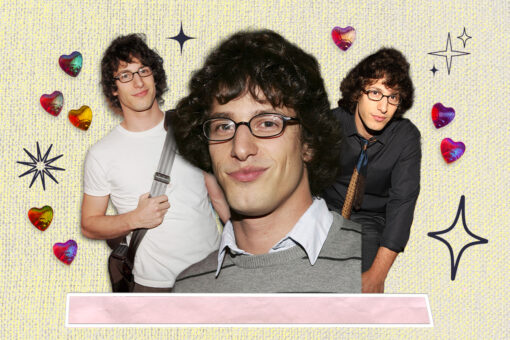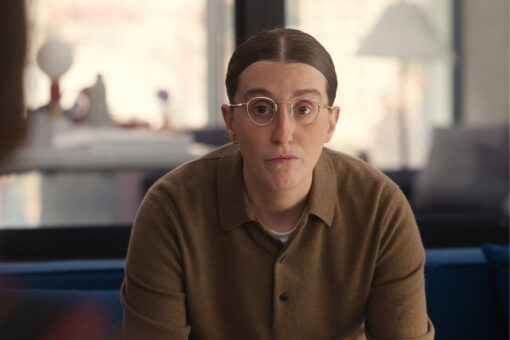Yseult Polfliet has always known she has a Jewish soul. The Rwandan model — born in Burundi, raised in Brussels, now a New Yorker — visited Israel in November 2018 and fell in love. She was only there for 10 days, but her trip to Tel Aviv to meet up with Gabrielle, her now partner, confirmed what she always knew about herself.
“I don’t know how to explain it, but I’ve always had this calling to discover Judaism and Israel. They’ve always been in my heart without really understanding how it’d play out in my life. I felt a really strong pull,” Yseult, 32, explains to me over the phone from her home in New York City. “I’m from Rwanda, and our genocide happened in ’94. And the Jewish story is super similar; there’s like this kinship in sadness, in trauma.”
Let me back up: Yseult is a multi-talented woman. She works as a model, co-founded a gender-free children’s clothing brand, YOAH, with her brother, and launched a podcast, the Kinswomen Podcast, dedicated to creating space for candid conversations on race between white women and women of color. I first discovered her while scrolling through Instagram and finding her page (@yseultnyc), which is full of gorgeous photographs — replete with Yseult wearing a Star of David necklace in some portraits — and her thoughts about the process of converting to Judaism. On the phone, we talked all about Judaism, the Jewish community, and creating spaces for hard conversations.

So where did her journey to Judaism begin? On a vacation in Tuscany, Yseult recalls. “I remember being on a hill and looking out and [thinking], so when does Judaism play into my life? This isn’t it. This cannot be the story.”
A little over a year later, that story began. One night in New York, Yseult met Gabrielle, a Canadian living in Israel. The two women connected over Rwanda — Gabrielle had been to Rwanda, and understood Rwandan culture — and their shared interest in Israel. In case she ever planned on returning to New York, Yseult gave Gabrielle her number and told her to reach out. “I wasn’t trying to court her or anything!” Yseult says with a laugh.
Gabrielle finally came back to New York and texted Yseult that she was out with a bunch of Rwandan friends. “And I’m like, what? Like, wait a minute. This is so strange! I don’t know [many] Rwandan people in New York. And I said okay. I had just gotten a pair of pants that Pyer Moss had put out in a new collection and I [thought] I’ll wear my new pair of pants. It was a good excuse.”
They instantly clicked, and that night, Yseult started looking for tickets to Tel Aviv to visit Gabrielle. (Gabrielle joined the IDF after graduating from her Canadian high school, and after completing her service, stayed in Israel for her undergrad.) A month later, Yseult arrived in Tel Aviv.
“I felt like I was home. I had never felt a sense of home like that. I grew up in Brussels, Belgium. I’m Rwandan diaspora, but I was born in Burundi. We had the genocide in ’94 in Rwanda, but there were other massacres that happened where a lot of Tutsis had to flee. So, my grandmother had fled [Rwanda] in ’59.” The 1959 Revolution, lasting until 1961, was a period of intense ethnic and anti-colonial violence between the Hutu and the Tutsi, eventually ending in the abolishment of the Belgian colony and an independent Rwanda.
Now, Yseult loves going back to Rwanda, and says it too feels like home, but when she arrived in Tel Aviv, it felt like her “soul was full.”
“I don’t know how to explain it. Growing up in Belgium, living in America, coming from Africa, I had felt a sense of like, Where the hell am I gonna raise my children? I don’t like Europe. It’s fucking racist, it’s anti-Semitic. I don’t like America, it’s violent. Africa — I love Rwanda, but we have too much trauma right now. Going home is too heavy.”
She stayed in an Airbnb in a Tel Aviv neighborhood, and “was living as if I lived there. I was so happy to be there with my new partner but at the same time, it was more than that.” Yseult texted her mom, who was in Belgium at the time, and told her, “This place is amazing.” Soon, her mom was on a flight to Israel, telling her daughter, “You’re not gonna get to experience this by yourself.”
Yseult recalls, “I came to pick her up at the airport with this sunny dress. When you see tourists, they look lost. I didn’t look like a tourist. I picked her up from the airport and she’s like, ‘Why do you look like you’ve been here?’ Like, I don’t know. It just feels important to be here!”
When she got back to New York after that whirlwind trip, Yseult knew her gut feeling leading her to Judaism was accurate. She started looking for synagogues and meeting with rabbis to discuss the conversion process.
“I was talking to [a lot of] different rabbis. You know, because being Black, being gay — it’s a lot. Finding your congregation, there’s this whole different kind of search. I went to different types of Judaism. I went to this one rabbi, she was a gay rabbi, a Black woman, and Reconstructionist. We sat down, had a meeting, and we both agreed, nah, it’s not gonna work.”
Eventually, she wound up at Central Synagogue in Midtown Manhattan.
“It’s an amazing synagogue,” Yseult gushes. “They’re super LGBTQ-friendly. Super warm. There were Black people! And I [thought], yes! This is perfect.” She’s working with Rabbi Lisa Rubin to begin her conversion process, starting classes this month. “I am so excited,” she says. “The process was tedious. I wanted to find the right space for me, and that also offered conversion. This class will be six months. It’s for anyone that’s interested in Judaism; you learn about everything — religion, culture, and history of the Jewish community. After that, there will be a more specific learning time, more interpersonal, specifically to my conversion. I like that this process isn’t easy and that there’s a real journey of learning.”

In the process of figuring out her Jewish identity, Yseult started going to Shabbat dinners with the Sephardic Mizrahi Q Network. (They work with OneTable, an organization that encourages young Jews to host Shabbat dinners.) “I met a group of people that were gay, from the LGBTQ community, and also Jewish, and they welcomed me with open arms. That’s where I made some friends. Now I have a bunch of girlfriends that are gay and Jewish, and they’re Mizrahi and Sephardi Jewish women! It’s a very specific kind of conversation.”
And how does her family feel about all this? “My parents are super supportive. They’re super cool, they’ve never been like super pro-religion, anyway. I’m very different from my parents. I have two brothers who are super loving, super supportive.”
Yseult even brought one of her brothers to services one Shabbat. “I’ll come with you,” he told her. “You seem really happy.”
I can confirm, when talking to Yseult, that she sounds incredibly happy. Maybe that’s because she’s found several projects where she can pursue her passions and help others along the way. One of those is her podcast that she launched in October 2019.
Yseult met her co-host, Hannah Pechter, at the Wing, a women’s co-working space and community. They both attended an event dedicated to bridging the gap between white women and women of color. A few days later, they bumped into each other at one of the Wing’s spaces, and Hannah recognized Yseult. Hannah, a white Jewish woman, invited Yseult to a meet-up she was doing in her living room, to continue the conversation that the event started, and so their friendship began. But soon, Yseult was leaving, again, for Tel Aviv (this time for three months).
“Right before I left for Tel Aviv, I went to one event — it was a tiny thing in her apartment,” Yseult says. “It was beautiful. I thought that it was cool for a woman like her to want to continue this conversation. So then I left. And then the meet-ups continued. And she did one every month. When I came back, I said, ‘Hey, Hannah, what about we put together a podcast? And we talked about this in public with other people?'”

And so began the Kinswomen Podcast, which is available on Apple Podcasts and Patreon. Yseult is a big proponent of leaning into the hard conversations, which is exactly what the podcast intends to do.
“I had a conversation with a friend when I came back from Israel,” Yseult recalls. “She said, ‘You spent three months in Israel, like, why? You feel comfortable over there?’ And I [replied], ‘Yeah, I do feel comfortable.’ And she’s like, ‘Yeah, but I heard there’s so much racism.’ I mean, racism is everywhere! I don’t experience more racism there than I experience in Belgium. I’ve experienced so much more fuckin’ shit in Belgium than in Israel. There’s ignorance everywhere, and there’s racism everywhere. But [in Israel], I felt comfortable. And I was having conversations with my friends trying to explain to them there’s no need to think that Jews are other than us — the struggle is the same.”
Yseult also launched a gender-free fashion line in fall 2018 with her brother, Noah, specifically for children who “don’t fit into a mold aesthetically.”
“I thought of my childhood, when I was a little girl. I had a whole phase when I hated clothing for girls. But there’s no fashion that gives you access to look cool and not look super feminine, or super masculine.”
https://vimeo.com/297827598
“If you address children,” she explains, “then you’re addressing the next generation. And hopefully, we can create a better path forward. What if we could raise children to be more independent in their style, and just let them be kids first?”
As for Yseult’s own style? “I like oversized things,” she says. “I’m very low key. I love modesty and fashion. I love when girls do what they do, like it’s not my business. But for me, personally, I love modesty. I love dark, oversized dresses.”
On her journey to figuring out her Jewish identity, Yseult also got involved with Eshel, an organization that helps Orthodox lesbian, gay, bisexual, and transgender individuals and their families. With a friend she met at OneTable, Yseult helped plan a party for Orthodox women still in the closet.
“This was going to be, in a nutshell, this special place where women that are not out yet [can] have a good night of being gay. You get to be with other women like you. I thought that was so, so beautiful. So opposite of who I am; I’ve always been open about myself and about my gayness. The privilege of just being able to be gay freely is something that I recognize.”
At the party, Yseult says, “there was one moment where I realized I’d entered a whole new world. No one asked me ever, Are you Jewish? What are you doing here? I’ve always been asked that everywhere. When I was in Belgium, I have a passport that says I’m Belgian. But, obviously, I’m Black. So it’s always like, Yeah, but what are you? With me being involved with Jewish communities, no one has ever asked me, What are you? Why are you here? No one asked me. No one cared. I felt so comfortable.”
All images of Yseult Polfliet by Zohar Shitrit. Many thanks to Maddy Albert for help with transcriptions. And for Yseult for answering my DMs on Instagram.



